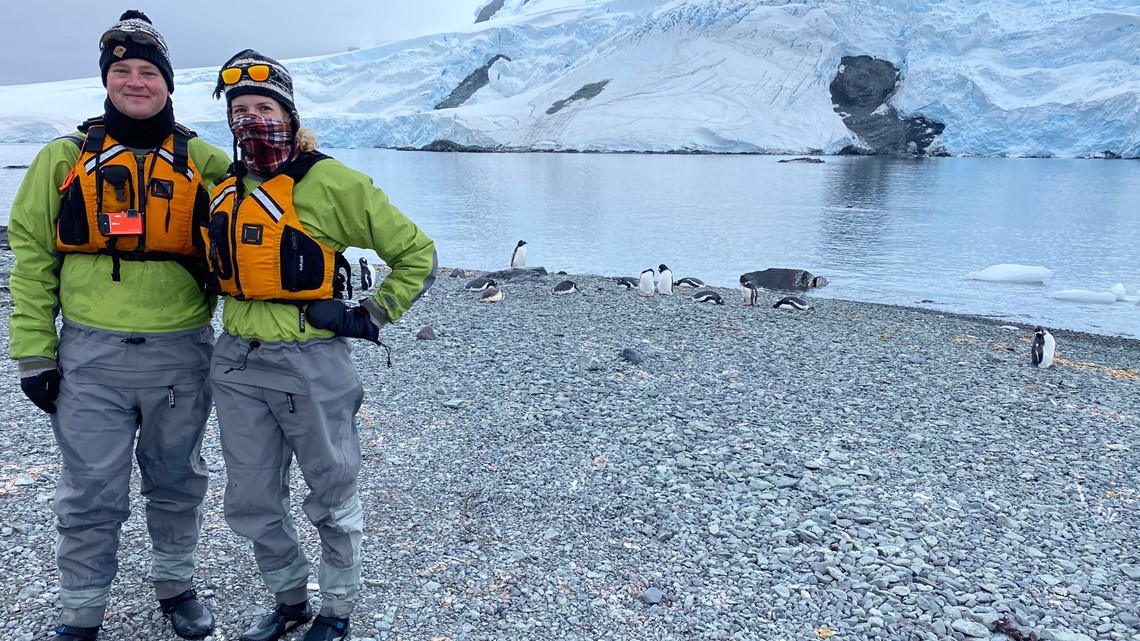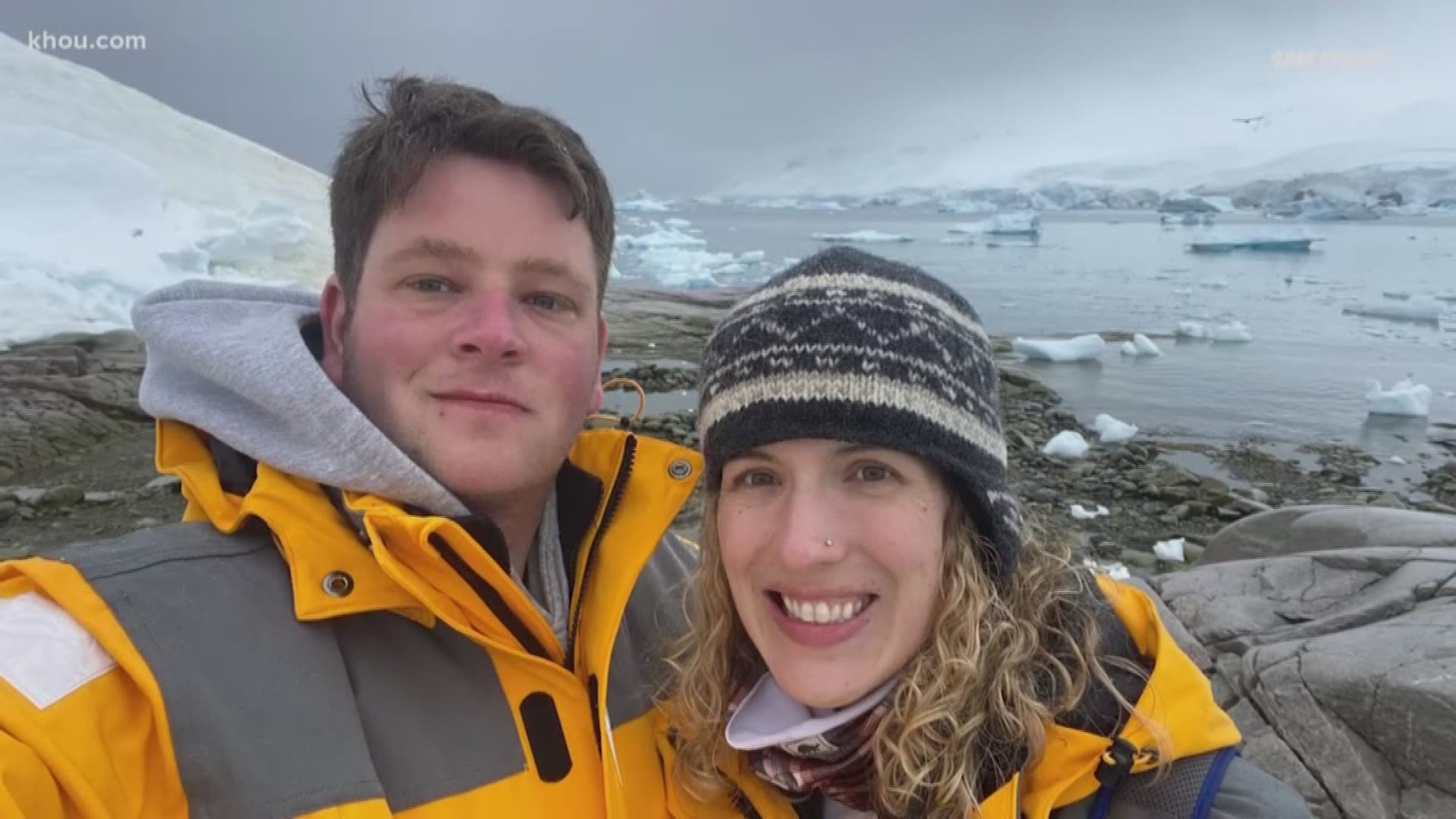Editor's note: “The couple returned to the U.S. early Thursday morning, March 26, 39 hours after leaving their hotel in Argentina.”
You’d think being stuck on one’s honeymoon could be fun, but not when you can’t leave the hotel room, can’t travel and can’t get a flight home because of a pandemic.
And also not when you’re needed back home to help fight the very pandemic that’s stranded you and is killing people all over the world.
“If I were back in the (U.S.) right now, I would be working on developing hospital protocols for the treatment of patients with COVID-19, I'd be dealing with issues with the drug supply. I would be very much an integral part of the response to this pandemic,” said Sam Aitken, an infectious disease clinical pharmacist working at one of the hospitals in the Texas Medical Center.
Aitken and his wife, Marisa, delayed their honeymoon by two years and put an incredible amount of planning into a trip to Antarctica.
RELATED: Houstonians urged to stay their homes after several first responders test positive for COVID-19
“We kind of like these cold, mountainous places with water nearby,” Aitken said. “We were looking at New Zealand and then just popped in our heads to go to Antarctica and had heard from a couple of people. It was an amazing place to go. And it absolutely is. It's incredibly beautiful. It's just a landscape that doesn't exist anywhere else on Earth. And, you know, we are maybe a little bit upset with the extended vacation, but we don't regret going there at all. It's just it was an incredible experience and it's a lifetime place to visit.”
When they began their journey in early March, Aitken said they were aware of a few cases of COVID-19 reported in Latin America, but said neither they nor many others could have anticipated the total global lockdown.
“We've had, I think, five flights canceled on us in the last 24 hours,” Aitken said Tuesday morning sitting in his Buenos Aires, Argentina, hotel room that neither he nor his wife can leave.
Aitken said the couple reached out to the U.S. embassy in Buenos Aires that told them to fly commercial.
“But like I said, it [commercial flights] sort of pops in and out of existence. So, there is no way to know whether you will be able to get the flights that you think you’re going to get,” Aitken said.


When KHOU 11 checked in with Aitken late Tuesday afternoon, the couple was at the airport hoping to board a commercial flight to Brazil and get a connecting flight to the U.S. from there.
As of Monday, the U.S. State Department estimated more than 13,500 Americans have reached out to the U.S. consulates or embassies all over the world, asking for help to return home.
In a briefing transcript posted on its website, senior state department officials who spoke to reporters estimated that in all, some 10 million U.S. citizens were living abroad. But most of them were residents of those countries and didn’t want to come back. The people who reached out for help getting back to the U.S. are considered expats or tourists who were overseas temporarily.
“We’re working around the clock to bring U.S. citizens who are stranded overseas back home,” one senior state department official said in the briefing.
The state department stood up a task force last week, saying to date they’ve brought more than 5,000 Americans home from 17 countries, anticipating bringing home “thousands more in the coming days and weeks.”
“This is truly an unprecedented effort to bring Americans from every region of the world in these rapidly changing conditions on the ground,” a senior state department official said in the Monday briefing, according to the transcript available online.
While the state department has chartered flights to bring Americans home, during the briefing, officials said they encouraged travelers to try commercial airlines first, while those are still available.
“We are using in some cases – and I expect this will be happening in an expanded fashion as we go out from here – we’re using what’s called the K Fund. It’s a special fund authorized by Congress to allow us to meet unexpected emergencies. We have organized a number of flights already on the K Fund, K Fund charters, and there are going to be more of those starting today, [Monday] in fact,” one senior state department official said.
“I’m hopeful that we’re able to get out,” Aitken said. “And I’m not optimistic that will actually happen.”
Coronavirus symptoms
The symptoms of coronavirus can be similar to the flu or a bad cold. Symptoms include a fever, cough and shortness of breath, according to the Centers for Disease Control.
Most healthy people will have mild symptoms. A study of more than 72,000 patients by the Centers for Disease Control in China showed 80 percent of the cases there were mild.
But infections can cause pneumonia, severe acute respiratory syndrome, kidney failure and even death, according to the World Health Organization. Older people with underlying health conditions are most at risk.
The CDC believes symptoms may appear anywhere from two to 14 days after being exposed.
Human coronaviruses are usually spread through...
- The air by coughing or sneezing
- Close personal contact, such as touching or shaking hands
- Touching an object or surface with the virus on it, then touching your mouth, nose or eyes before washing your hands.
Help stop the spread of coronavirus
- Stay home when you are sick.
- Eat and sleep separately from your family members
- Use different utensils and dishes
- Cover your cough or sneeze with your arm, not your hand.
- If you use a tissue, throw it in the trash.
Lower your risk
- Wash your hands often with soap and water for at least 20 seconds. If soap and water are not available, use an alcohol-based hand sanitizer.
- Avoid touching your eyes, nose, and mouth with unwashed hands.
- Avoid close contact with people who are sick.
- Clean and disinfect frequently touched objects and surfaces.
- If you are 60 or over and have an underlying health condition such as cardiovascular disease, diabetes or respiratory illnesses like asthma or COPD, the World Health Organization advises you to try to avoid crowds or places where you might interact with people who are sick.
Get complete coverage of the coronavirus by texting 'FACTS' to 713-526-1111.

